February 15, 2020
by Carla Hay

Directed by Dimitri de Clercq
Culture Representation: Set in Morocco, the psychological drama “You Go to My Head” centers on a two white European characters: a middle-aged, reclusive architect and the mysterious young woman with amnesia whom he’s fooled into thinking that she’s his wife.
Culture Clash: The architect goes to certain lengths to keep his disturbing secret, knowing that the woman he’s tricked could find out the truth and leave him.
Culture Audience: “You Go to My Head” will appeal mostly to people who like atmospheric arthouse films, but the movie’s impressive cinematography can’t make up for the silly plot and substandard acting.

“You Go to My Head” is a perfect example of a movie that has artsy aspirations but the story is the equivalent of a bad sketch that belongs in the garbage. There are children who could come up with a better plot than the one concocted by Dimitri de Clercq (who directed this movie), Pierre Bourdy and Rosemary Ricchio, who all wrote the movie’s screenplay. It’s a shame, because many other elements of the movie work very well, especially the gorgeous cinematography by Stijn Grupping and the sometimes perfectly eerie musical score by Hacène Larbi. But the movie’s story is just so maddingly dull and insipid that it’s a near-miracle that people were willing to put up money to have this ridiculous story made into a movie.
“You Go to My Head” begins at the scene of a car accident in the middle of the Moroccan desert, where a car is toppled over on its side. The male driver is dead or unconscious, and the female passenger (played by Delfine Bafort) has a bleeding head injury, but manages to escape from the car. The next 15 minutes are a mostly silent slog through the desert, as the woman tries to find help and grows weak from lack of food and water. She stumbles onto a well, and screams in despair when she sees that the water in the well is too far for her to reach.
After she collapses from the heat and exhaustion, a middle-aged man (played by Svetoczar Cvetkovic) drives up in his jeep and sees her lying on the ground, nearly unconscious. He gives her water, carries her to his jeep, and drives her to a small, isolated adobe house, where he places her on a bed to recover from her ordeal. A doctor visits the house and assumes that the woman is the man’s wife, and the man doesn’t correct him. The doctor tells the man that she will recover from her bleeding wounds, but she’s in shock and has amnesia, and it’s unknown if she will get her memory back.
As the man creepily looks at the attractive young woman in the bed, you can almost hear him thinking that he’s going to take advantage of the situation. And he does. The woman doesn’t have any identification on her except for a Hello Kitty watch with an inscription on the back. He steals the watch and hides it. And guess what this wacko decides to name this mystery woman? Kitty.
When she regains enough consciousness to be able to talk, she asks him if she can go home. He tells her that his name is Jake and that he’s her husband, she was in a car accident, and they’re staying at a hotel until she’s well enough to go back home with him. The woman eyes him suspiciously while he feeds her soup, but not once does she ask any important questions, such as “How do I know you’re not lying to me? Where’s my identification? If this is a hotel, where is everyone, besides the doctor who occasionally comes to visit?”
At some point during “Kitty’s” recovery, Jake has found the time to get her a wedding ring that fits her perfectly, because he slips it on her ring finger when she’s asleep. When she’s well enough to go home with him, she never asks any questions, which is a troubling indication that the writers of this movie think this “Kitty” character and the audience must be very stupid.
Jake takes her to a larger, modern all-white house that’s also isolated. It has a swimming pool but not much furniture and apparently no Internet access, because it’s never shown in the movie. Jack uses a cell phone but “Kitty” never does, and she never shows any interest in doing so, which is another indication of how dumb this character is.
It’s at the house that “Kitty” starts to ask some questions that she should’ve asked before she let a strange man drive her to this place in the middle of nowhere. Jake has a convenient answer for everything. But first, he’s concocted an elaborate story that this dimwit willingly believes.
He says his name is Jake Peters, and her name is Katja, but she has the nickname Kitty, and she’s a housewife. He tells her that he’s 54, she’s 35, and they’ve been married for six years. And he says that he’s never been married before, and they have no kids together, but they plan to start a family. He also tells her that she’s an only child and her parents died before he met her. “Kitty” never asks if she has any family members or friends who can verify her identity. She also never asks what her maiden name was or her date of birth.
Why is the house barely furnished? Jake tells her that they’re redecorating. Why is he sleeping in a sleeping bag on the floor in another room instead of in their marital bed? He says he wants to give her enough space to recuperate. Why are there no photos of them in the house? Jake says they put almost all of their possessions in storage in the previous year, but everything was destroyed in a fire.
But the one question that “Kitty” doesn’t ask (and this is why the movie is so incredibly dumb) is: “Who are our friends and can they verify anything you’ve said?” Instead, she believes everything that Jake tells her about her identity and her past, even though he’s shown no proof that he’s telling the truth. There’s a caretaker who visits the property on occasion, but “Kitty” doesn’t ask him any questions until much later than anyone with common sense would have.
For most of the movie, “Kitty” seems to be in a daze, as Jake slowly gains her trust and eventually ends up sleeping in the same bed with her. It doesn’t help that Bafort is a very robotic actress, so in that respect, she doesn’t have much of a challenge when she has to play someone as empty-headed as “Kitty.” Except for a few scenes (such as when she breaks down and cries in the shower), “Kitty” doesn’t have much of a reaction to the severity of her amnesia.
Much of this slow-paced movie consists of her wandering around the house, getting in and out of the shower or swimming pool (apparently excuses for this movie to have full-frontal female nudity, but not any full-frontal male nudity), and passively believing everything Jake has told her. And the movie never explains this, but “Kitty” also happens to have a closet full of clothes that conveniently fit her perfectly when she and Jake first arrive at the house. Did Jake take her measurements while she was unconscious?
Jake seems to want to keep “Kitty” as isolated as possible, but when he realizes that she’s incredibly bored (as many viewers of this movie will be too), he suggests that they take a road trip, and she eagerly says yes. One of the places they visit is a beach, where Jake finally gets what he wanted all along, and they have sex, before heading to a hotel in Marrakesh.
While at the hotel, “Kitty” gets a major clue that Jake isn’t the wonderful person he portrays himself to be when she overhears the hotel manager talking to Jake about an unpaid bill. When she asks Jake about it, he says that the manager had mistaken him for someone else who had stayed at the hotel before but had skipped out on paying the bill. Of course, the gullible “Kitty” readily accepts this flimsy and not-very-believable explanation.
But anyone with any common sense can see the biggest mistake that Jake made from the beginning: He told “Kitty” that they were married for six years. Therefore, not only does he have to figure out a way for Kitty not to discover the truth from people that he knows, but he also has to explain to people who’ve known him for years why this mystery woman who suddenly showed up in his life is now supposed to be his wife of six years.
Jake lives in an isolated house, but his work as an independent architect requires him to have contact with people who can easily expose his lies. And then there are other people who do maintenance around the house, such as the caretaker. Did Jake think that they would never talk to Kitty and vice versa? Jake would basically have to keep “Kitty” hidden away from everyone he knows in order for his twisted lies to not be exposed. These are just some examples of how this movie’s screenplay is ill-conceived and badly written.
The good news is that, as Jake, actor Cvetkovic doesn’t give a one-note performance. The bad news is that it’s a two-note performance: creepy and creepier. There’s nothing attractive or sympathetic about Jake, which makes the ending of the movie the worst part of the story. There’s underlying misogyny in this story, which wants viewers to believe that a woman with amnesia can be easily manipulated into being someone’s glorified sex doll. Filming this movie in exotic locations doesn’t make it “art” and can’t cover up the fact that, at its core, “You Go to My Head” is exploitative trash.
First Run Features released “You Go to My Head” in New York City on February 14, 2020, and will release the movie in Los Angeles on February 21, 2020. UPDATE: First Run Features will release “You Go to My Head” on digital, VOD and DVD on February 9, 2021.
